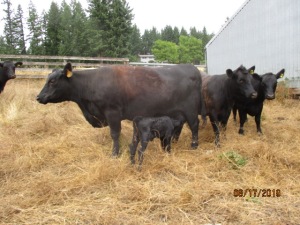No Longer Welcome
Our loaner herd of cows consisting of Topanga, her calf and three bred heifers had been serving on pasture grazing duty at a neighbor farm since spring. This herd has been doing a fine job all summer long, keeping the pastures trimmed up and the fire danger low for the farmer who no longer keeps his own herd of livestock. It is a win, win situation, we don’t have to worry about feeding the critters and the neighbor gets pasture maintenance.
 By August of a typical year when the summer sun dries the dirt beneath the grass and there is no new growth, we move the loaner herd back home. But the muggy summer without the sweltering high temperatures and with the unusual thunderstorms of August, grass kept growing so the neighbor farmer was happy to keep the herd well past the normal dates. That worked well for us since Topanga was quite pregnant at the time and we don’t like to haul animals so near to calving. It was August 17 when Topanga birthed her heifer calf, Donna. You can review her story from the post called A New Late Addition dated 8/21.
By August of a typical year when the summer sun dries the dirt beneath the grass and there is no new growth, we move the loaner herd back home. But the muggy summer without the sweltering high temperatures and with the unusual thunderstorms of August, grass kept growing so the neighbor farmer was happy to keep the herd well past the normal dates. That worked well for us since Topanga was quite pregnant at the time and we don’t like to haul animals so near to calving. It was August 17 when Topanga birthed her heifer calf, Donna. You can review her story from the post called A New Late Addition dated 8/21.
With the loaner herd now totaling five instead of four, they continued on with their job of vegetation control as the neighbor farmer moved the herd from pasture to pasture around his farm. We had planned on picking up the herd last week, but our schedule and the neighbor schedule didn’t work out and we procrastinated. We decided to pick up the herd this coming week, which would have been fine, until it wasn’t.
Sunday morning we got a call from the neighbor saying that the herd had broken through an old gate, had tromped through the large wheat stubble field and found their way into the yard around the house, was munching all the beautiful flowers and leaving big hoofy prints all over the lawn. The herd had overstayed their welcome.
We jumped into action. I was already dressed for farm work with boots and rain clothes so I started the car and headed for the neighbor farm. Mike attached the stock trailer to the pickup and followed me about 10 minutes later.
The wife, husband and I were able to convince the herd that they needed to go out of the yard, back through the field, find the open/broken gate and proceed through. Did I happen to mention that this was a BIG field, it was on a fairly steep hillside, there were gopher holes everywhere, it was raining, and this was the first time the herd had been outside their normal boundaries so were a bit worked up? The normally docile herd that comes running when you call them were not in the mood to respond to calling, we had to convince them through gentle pushing to go in the right direction. Baby Donna was all flustered and wasn’t sure what in the heck was going on, and riled up the three heifers.

The three of us were able to get the herd back into their large pasture, then into a smaller barnyard pen by one of the barns. By the time Mike rolled in with the stock trailer, the herd was ready to be loaded and moved home. The neighbors gate is now on our winter chore list to fix, but we may procrastinate tackling that job for a little while longer.